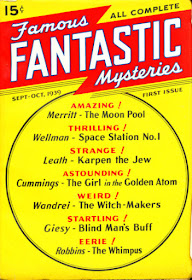Strange Stories
A short-lived fantasy- and horror-fiction companion to Thrilling Wonder Stories and the rest of the Thrilling Group, it featured many of the same contributors as the other Better Publications magazines and Weird Tales. Despite publishing some interesting fiction, such as Manly Wade Wellman's "The Changeling" in the first issue, it is not well-remembered today.
Background
1939 was a banner year for fantasy pulp; Street and Smith's Unknown (edited by John W. Campbell, Jr.), the fantasy/sf Munsey reprint magazine Famous Fantastic Mysteries (edited by Mary Gnaedinger, and soon to include notable new fiction along with reprints), and Ziff-Davis's (initially mostly science-fictional) Fantastic Adventures (edited by Ray Palmer) all joined Weird Tales (then in transition from the ailing Farnsworth Wright to Dorothy McIlwraith, who became officially the editor in 1940) on the newsstands, as did a new magazine from the Standard Magazines group (note the three corporate names; same people, who would also add the sf title Startling Stories the same year), the modestly-titled Strange Stories.
Edited anonymously by Mort Weisinger, SS featured a mix of fiction rather similar to that of Weird Tales, with a slightly less gothic sensibility than WT and lacking the heroic fantasy component stressed in the other magazines. In the first issue, February 1939, along with a long editorial column attributed to "Mephistopheles", there were stories by such WT and Thrilling Group veterans as Robert Bloch (two stories, one as by "Tarleton Fiske"), Henry Kuttner (two stories, one as by "Keith Hammond," which playfully drew not only on Lovecraftian Cthulhu Mythos motifs but specifically on Bloch's own contributions to that Mythos, notably the "forbidden" book The Mysteries of the Worm), Otis Adelbert Kline, Ralph Milne Farley, and collaborators August Derleth and Mark Schorer.
Wellman's "The Changeling" is perhaps the best-remembered story from that first issue, and one of the few from the magazine's run of thirteen bimonthly issues to be cited by historian Mike Ashley as rising above the general run of competence.
Seabury Quinn, Eric Frank Russell, Leigh Brackett and E. Hoffmann Price were among the other notable contributors to the magazine; Ashley has noted that Weisinger's moving on from the Thrilling pulp line to edit Superman and other DC comics was coincident with, and probably resulted in, the folding of SS with the February 1941 issue.
Strange Stories, February 1939
A short-lived fantasy- and horror-fiction companion to Thrilling Wonder Stories and the rest of the Thrilling Group, it featured many of the same contributors as the other Better Publications magazines and Weird Tales. Despite publishing some interesting fiction, such as Manly Wade Wellman's "The Changeling" in the first issue, it is not well-remembered today.
Background
1939 was a banner year for fantasy pulp; Street and Smith's Unknown (edited by John W. Campbell, Jr.), the fantasy/sf Munsey reprint magazine Famous Fantastic Mysteries (edited by Mary Gnaedinger, and soon to include notable new fiction along with reprints), and Ziff-Davis's (initially mostly science-fictional) Fantastic Adventures (edited by Ray Palmer) all joined Weird Tales (then in transition from the ailing Farnsworth Wright to Dorothy McIlwraith, who became officially the editor in 1940) on the newsstands, as did a new magazine from the Standard Magazines group (note the three corporate names; same people, who would also add the sf title Startling Stories the same year), the modestly-titled Strange Stories.
Edited anonymously by Mort Weisinger, SS featured a mix of fiction rather similar to that of Weird Tales, with a slightly less gothic sensibility than WT and lacking the heroic fantasy component stressed in the other magazines. In the first issue, February 1939, along with a long editorial column attributed to "Mephistopheles", there were stories by such WT and Thrilling Group veterans as Robert Bloch (two stories, one as by "Tarleton Fiske"), Henry Kuttner (two stories, one as by "Keith Hammond," which playfully drew not only on Lovecraftian Cthulhu Mythos motifs but specifically on Bloch's own contributions to that Mythos, notably the "forbidden" book The Mysteries of the Worm), Otis Adelbert Kline, Ralph Milne Farley, and collaborators August Derleth and Mark Schorer.
Wellman's "The Changeling" is perhaps the best-remembered story from that first issue, and one of the few from the magazine's run of thirteen bimonthly issues to be cited by historian Mike Ashley as rising above the general run of competence.
 |
| The second issue. "Tally Mason" was August Derleth |
Strange Stories, February 1939
- Cover: Rudolph Belarski
- Cover artist credit taken from Robinson, Weinberg and Broecker's Art of Imagination. Pulp Vault No. 14 credits it to Graves Gladney.
- 15 • The Singing Shadows • novelette by Vincent Cornier
- 41 • The Curse of the House • short story by Robert Bloch
- 52 • Eyes of the Serpent • short story by August Derleth and Mark Schorer [as by Mark Schorer and August W. Derleth]
- 69 • The Invaders • short story by Henry Kuttner [as by Keith Hammond]
- 80 • Changeling • short story by Manly Wade Wellman
- 87 • The Sorcerer's Jewel • short story by Robert Bloch [as by Tarleton Fiske]
- 97 • Major McCrary's Vision • short story by Ralph Milne Farley
- 102 • The Frog • short story by Henry Kuttner
- 112 • Servant of Satan • novella by Otis Adelbert Kline






















